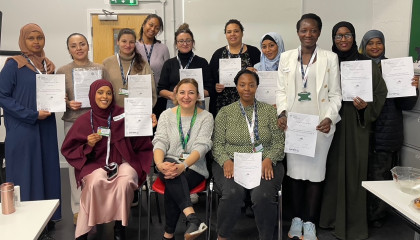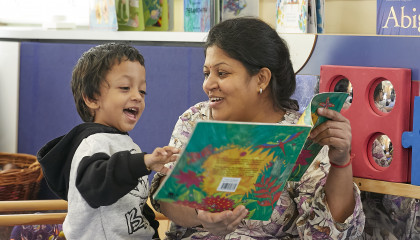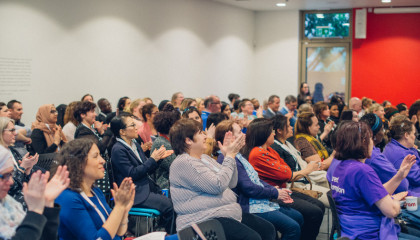You are here: Getting it right for the next generation starts with the right early years policies
breadcrumb navigation:
- Home /
- Getting it right for the next generation starts with the right early years policies

Getting it right for the next generation starts with the right early years policies
Ellen Broomé
1 September 2017
A new report from Lucy Powell MP and the Social Market Foundation shows just how important the early years can be in supporting social mobility. It looks at whether money being spent by Government on the early years reaches those families who are most in need. In total, out of the £9.1bn expected to be spent on the early years in this Parliament, only a quarter will reach the bottom half of families by income.
Given the work that we at Family and Childcare Trust have done in this area, I was very glad to have the opportunity to contribute to this report. As the report highlights, it is important to invest in childcare for two key reasons. Firstly, providing affordable and flexible childcare allows parents to go back to work after having children, boosting economic productivity and tackling child poverty. Raising family incomes can significantly raise children’s attainment.
Secondly, providing high quality childcare has the power to boost child development and tackle disadvantage. More frequent use of formal childcare leads to better outcomes for children, regardless of family disadvantage or the quality of their home learning environment.
It is possible for early years policy to fulfil both these opportunities: that’s why the early years hold such great potential for social mobility. But this report rightly highlights reasons to be concerned that the quality of childcare is in danger of being overlooked as funding focuses on getting parents into work.
Childcare can help to narrow the achievement gap between disadvantaged children and their peers that opens up before children even start school. But only if the provision is high quality. This report recommends doubling the pupil premium and reforming Ofsted inspections to help push up quality. We agree that we need a relentless focus on making sure that childcare is of the highest quality to support all children’s development, but disadvantaged children in particular.
In the interests of ensuring hard to reach children access childcare, Lucy highlights that improving awareness of the offer for 15 hours of free childcare for the 40 per cent most deprived 2 year olds is key. This is a key aim of our Parent Champions scheme which is a network of parent volunteers who give a few hours a week to talk to other parents about the local services available to families.
Government investment in childcare currently takes several forms, from tax-free childcare and universal credit to offering ‘free hours’ of childcare, such as the 30 hour entitlement for three and four year olds beginning in September. Families may be eligible for different funding schemes based on their income or their child’s age, and as their situation changes, what they are entitled to changes. The complex system of various benefits and entitlements is difficult for parents to navigate.
Even when families can find their way round what they are entitled to, some will still find that they are not better off working once they have paid for childcare. In this report, Lucy argues that new funding for the early years is not focused on where it will make the most difference: the most disadvantaged families. Of the £9.1bn of additional funding due to be spent on childcare in this Parliament, almost half (£4.2bn) is set to be spent on tax free childcare. This reimburses 20 per cent of childcare costs up to a total of £2,000 per child.
While popular with parents struggling with high bills, we argued that the scheme is not well targeted to help low to middle income families who most need help with childcare costs. There is also a risk that putting more money in parents pockets to spend on childcare could push up prices. We hope that as the scheme rolls out, the Government continue to evaluate the impact it is having on the childcare market and family finances and working patterns. We have called for simplified funding for childcare that makes sure parents are always better off working and is paid directly to childcare providers. It would allow the government to effectively influence the quality, affordability and flexibility of childcare.
This work is valuable in sparking debate about how best we spend money on the early years to get the results we, as a society, need. We have seen significant and welcome investment in the early years in recent years, and as these policies come into practice, it is essential to continue to monitor whether they are achieving the outcomes we are aiming for.

More from our blog
Parent Champions Conference and Awards 2025
What a fantastic two days at the Parent Champions Conference and Awards 2025!
The Exciting Story Of The First Year Of Books Together
The Exciting Story of Books Together
The NAFIS Conference and Awards 2024
Read about the NAFIS Conference and Awards 2024
Sign up to our newsletter
Get the latest news, research and resources from Coram Family and Childcare



